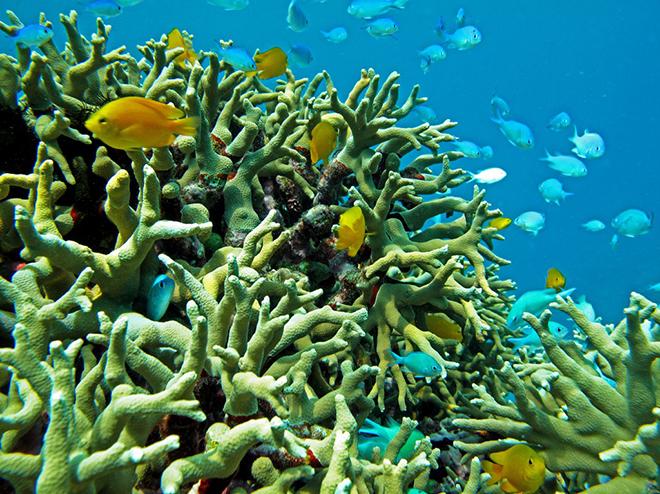Endangered species are like Movie Stars - Charlie Sheens and Tom Hanks
by Rob Jordan on 3 Aug 2014

Scientists challenge theory on protection of threatened species Australian Institute of Marine Studies (AIMS)
Instead of simply concentrating conservation efforts on threatened species, resource managers and policymakers should consider ecosystem-wide impacts, say a group of scientists.
A new analysis published in ¬Conservation Biology challenges a widely accepted theory that protecting threatened species with unique functional roles is synonymous with protecting ecosystems. In fact, the study's subject, the bumphead parrotfish, is a prime example of a threatened species that, in high numbers, can damage its surroundings.
Among the nine authors of the study are four members of the Stanford faculty and one graduate student.
Instead of simply concentrating conservation efforts on the bumphead or any other threatened species, resource managers and policymakers should consider these species' diverse impacts and the forces that mediate them, according to the study's authors.
'It's pretty hard to get it right if you just focus on one thing,' said co-author Rob Dunbar, the W.M. Keck Professor in Stanford's School of Earth Sciences and senior fellow, by courtesy, at the Stanford Woods Institute. 'What matters is a species' role in an ecosystem,' said co-author Doug Bird, a Stanford Woods Institute-affiliated senior research scientist in anthropology. People and their impacts on the natural world are part of this calculus.
'The key ecological players in natural ecosystems perform multiple functions,' said co-author Fiorenza Micheli, a biology professor affiliated with the Stanford Woods Institute and Stanford's Hopkins Marine Station. 'Basically they wear many hats. It is the sum of these diverse roles that determines their overall influence on the ecosystem.'
Good and bad effects
The researchers are careful to emphasize that their findings should not be interpreted as justification for rolling back protections of endangered species, or that threatened species commonly affect ecosystems in negative ways.
'Most species deliver a suite of impacts on ecosystems that could be construed as both positive and negative,' said lead author Douglas McCauley, a former doctoral student at Hopkins Marine Station and current assistant professor at the University of California, Santa Barbara.
'I think about the suggestion that all endangered species must be 'good' for the environment the same way I think about expectations that movie stars should all be good citizens.
Movie stars are just people. Endangered species are just species. In the world of endangered species there are Charlie Sheens and there are Tom Hankses, and everything in between.'
Working in Palmyra Atoll, a relatively untouched marine wilderness about 1,000 miles south of Hawaii, the Stanford researchers studied bumpheads, abundant in the study area but increasingly rare elsewhere in the world.
Like any species, the bumphead has positive and negative impacts on coral reefs. For example, the fish eats dead coral and fast-growing algae, freeing up space for new corals to generate. But it also eats living coral, thereby reducing coral diversity, abundance and size.
In a healthy ecosystem, predators such as sharks play a key role in modulating the intensity of these effects on corals. Where sharks are abundant, bumpheads avoid high-diversity coral reef areas and their negative impacts are minimized.
If shark populations continue to drop due to overfishing, bumpheads will likely continue to damage corals. This, in turn, could lead to a die-off of coral-dependent sea life that many people depend on for their food and livelihoods.
'There are many reasons to not hunt sharks, but people probably weren't thinking it could affect the reefs,' Dunbar said. 'It's about understanding pathways.'
'Conservation efforts should aim to protect and restore the whole ecosystem, including top predators such as sharks, and the complex web of direct and indirect relations that link large marine animals all the way to corals,' Micheli added.
Ecosystems more fragile
Climate change and other widespread impacts have made ecosystems more fragile than ever, McCauley said. 'The rules of resiliency are changing. By acidifying the marine environment and turning up ocean temperatures, we have created a future that is going to be incredibly challenging for corals. Suddenly, natural stressors that mattered little before, like the munching of mega-parrotfish, may indeed matter and will need to be accommodated in our plans for reef management in coming decades.'
The point is to collect as much information as possible about an ecosystem and its key players in order to ensure more effective conservation efforts, McCauley said. 'Frank characterizations of the diversity of a species' ecosystem impacts – good and bad – will lead to more informed decisions about the management of species populations and the ecosystems in which they are embedded.'
Still, McCauley stressed, bumpheads' impacts pale in comparison to human impacts. 'We can and should make more room for some of these natural stressors by reducing our own impacts on reefs.'
The five Stanford co-authors are Eleanor Power, graduate student in anthropology; Doug Bird, senior research scientist in anthropology; Bill Durham, Bing Professor in Human Biology and Senior Fellow at the Woods Institute for the Environment; Dunbar and Micheli. Also co-authors are McCauley and Hillary Young of the University of California Santa Barbara; Roger Guevara of the Departamento de Biología Evolutiva, Instituto de Ecología AC, Xalapa, Veracruz, Mexico; and Gareth Williams of the Center for Marine Biodiversity and Conservation, Scripps Institution of Oceanography, La Jolla, Calif.
This research was funded by the National Science Foundation and the Stanford Woods Institute's Environmental Venture Projects (EVP) program.
If you want to link to this article then please use this URL: www.sail-world.com/125159